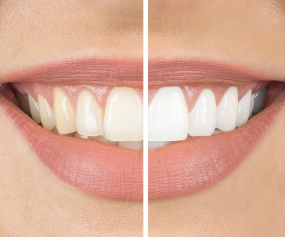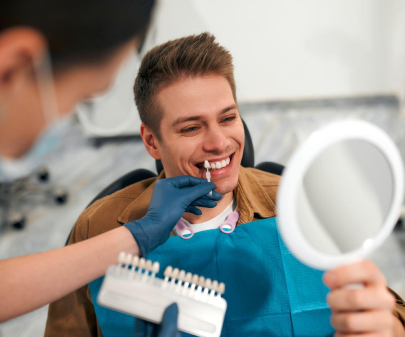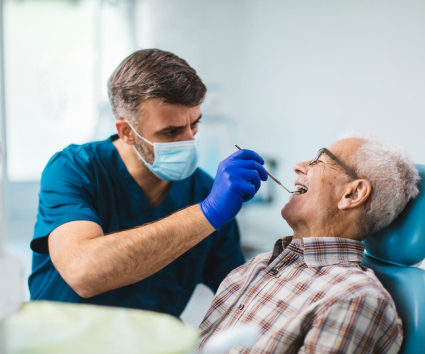
Teeth Whitening

What is teeth whitening?
Teeth whitening is a cosmetic dental method that removes stains and discoloration from the teeth, resulting in a brighter and whiter smile. This process can be performed in-office or at home using whitening toothpaste, strips, gels, or natural therapies.
Causes of teeth discoloration
Teeth can become discolored due to a variety of circumstances, including:
-
Aging:
As we age, our tooth enamel thins, making our teeth appear yellowish or grayish.
-
Smoking:
Nicotine and cigarette tar can develop yellowish stains on the teeth.
-
Drinking coffee, tea or red wine:
These beverages contain chromogens, which may stick to the tooth enamel and produce discoloration.
-
Oral hygiene:
Plaque buildup can cause tooth discoloration without brushing or flossing regularly.
-
Drugs:
Certain drugs, such as tetracycline and antihistamines, can cause tooth discoloration.
Types of teeth whitening treatments
There are two different types of teeth whitening treatments:

In-Office Teeth Whitening:
In-office teeth whitening is a professional process performed by a dentist or dental hygienist. The procedure starts with the application of a bleaching agent to the teeth, which is then activated with a particular light. This procedure normally takes approximately an hour and can lighten your teeth by several shades.

At Home Teeth Whitening:
At-home teeth whitening products can be purchased over the counter or prescribed by a dentist. These products often contain fewer bleaching ingredients than in-office treatments and take longer to produce results. Among the most popular at-home teeth whitening products are:
-
Whitening trays are custom-made trays filled with bleaching gel and placed over your teeth.
-
Whitening strips are thin strips with a bleaching gel placed on the teeth.
-
Whitening gels are clear gels applied to the teeth with a brush.
Procedure for Teeth Whitening:
The procedure for teeth whitening can vary based on the type of whitening treatment used. In general, the procedure consists of the following steps:
-
Consultation:
Your dentist will examine your teeth and gums to determine if you are a good candidate for the whitening procedure.
-
Preparation:
The dentist will clean your teeth and might apply a protective gel or rubber shield to your gums to protect them from the bleaching solution.
-
Application:
The dentist will apply the bleaching solution to your teeth and may activate it with a laser or light.
-
Rinse:
After applying the bleaching solution, your dentist will rinse your mouth with water to eliminate any excess solution.
-
Final polishing:
After bleaching, the dentist may polish your teeth to remove any surface stains left by the bleaching solution.
-
Follow-up:
The dentist will give you information on how to keep your newly whitened teeth looking great.
Post Treatment care after Teeth Whitening
1. Avoid specific foods and drinks for at least 24 hours. Dark-colored meals and drinks include coffee, tea, soda, red wine, and tomato sauce.
2. Avoid smoking and the use of tobacco products.
3. Brush your teeth twice daily with a soft-bristled toothbrush and fluoride toothpaste.
4. Floss your teeth at least once every day.
5. Use a straw while drinking darkly colored liquids.
6. Use sensitive toothpaste to reduce any discomfort induced by the whitening operation.
7. Use a fluoride rinse to prevent your teeth from being sensitive.
8. Have frequent dental checkups and expert cleanings.
Benefits of teeth whitening:
Teeth whitening has various advantages, including:
-
Improving self-confidence:
A brighter smile can enhance your self-esteem and confidence.
-
Looking younger:
Yellow or stained teeth could make you appear older than you are. Teeth whitening can make you look younger and more vibrant.
-
Making a good impression:
A bright smile might make you appear more attractive and friendlier to others.
Risks and side effects
Teeth whitening treatments are typically safe when done appropriately. However, they may cause some negative effects, such as:
-
Tooth sensitivity:
Some people may have temporary tooth sensitivity following teeth whitening.
-
Gum irritation:
The bleaching substance used in teeth whitening might irritate the gums and cause discomfort.
-
Uneven outcomes:
Teeth whitening may not generate uniform effects, with some teeth appearing whiter than others.
Cost of Teeth Whitening Treatment:
The cost of teeth whitening in Chennai varies based on the type of whitening treatment you choose, the materials used, and the dentist's experience performing the process.
FAQS
-
Teeth whitening is generally safe when done correctly. It may, however, cause certain side effects, such as tooth sensitivity and gum discomfort.
-
Teeth whitening results can vary depending on the type of treatment and individual characteristics. Teeth whitening can last from six months to two years.
-
Teeth whitening treatments are generally safe when done properly. However, excessive usage or misuse of whitening solutions can damage tooth enamel and create sensitivity.
-
Teeth whitening is not recommended for kids under 13, as their teeth are still developing. It is better to wait until they are older and their permanent teeth fully emerge.
-
The frequency of teeth whitening will vary depending on the type of treatment and individual factors such as diet and lifestyle patterns. It is advisable to talk with our dentist to identify the optimum schedule for your unique needs.
-
Excessive use or misuse of teeth whitening products can damage tooth enamel and cause sensitivity. It is important to follow the instructions and avoid overusing the products carefully.
-
Good oral hygiene routines, including brushing, flossing, and frequent dental checkups, can help you keep your smile white. Avoiding stains-causing foods and beverages such as coffee, tea, and red wine will also assist.
-
Teeth whitening is a cosmetic procedure that is typically not covered by insurance. However, checking with your insurance provider to see if they cover teeth whitening is best.
